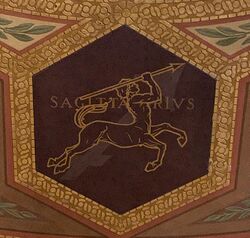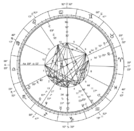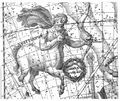Sagittarius (astrology)
Topic: Unsolved
 From HandWiki - Reading time: 3 min
From HandWiki - Reading time: 3 min
| Sagittarius | |
|---|---|
| Zodiac symbol | Archer |
| Duration (tropical, western) | November 21 – December 21 (2024, UT1)[1] |
| Constellation | Sagittarius |
| Zodiac element | Fire |
| Zodiac quality | Mutable |
| Sign ruler | Jupiter |
| Detriment | Mercury |
| Exaltation | South Node, Chiron (questionable) |
| Fall | North Node, Ceres (questionable) |
| Astrology |
|---|
| Background |
| Traditions |
| Branches |
Sagittarius (♐︎) (Greek: Τοξότης, romanized: Toxótēs, Latin for "archer") is the ninth astrological sign, which is associated with the constellation Sagittarius and spans 240–270th degrees of the zodiac. Under the tropical zodiac, the sun transits this sign between approximately November 22 and December 21.[2] Greek mythology associates Sagittarius with the centaur Chiron, who mentored Achilles, a Greek hero of the Trojan War, in archery.[3]
Sagittarius, the half human and half horse, is the centaur of mythology, the learned healer whose higher intelligence forms a bridge between Earth and Heaven. Also known as the Archer, Sagittarius is represented by the symbol of a bow and arrow.
Astrology

Along with Aries and Leo, Sagittarius is a part of the Fire Trigon as well as the last of the reproductive trinity.[4] It also follows Gemini and Virgo as third of the mutable signs, which are the signs that feature changeable quality.[5] When Sagittarius is depicted as an archer, then he is classified as human but when represented as a centaur, he is nonhuman (bestial).[6] However, the classification of the astrological sign as a human or bestial does not carry practical consequences for interpretation.[6]
As an archer, Sagittarius is said never to fail in hitting the mark and this depiction alludes to the power of prophecy, hence, the claim that seers and prophets are born in this sign.[4]
Cultural impression
It is the coat of arms of the Iranian city Isfahan.[7]
Gallery
Sagittarius as depicted in the 14th-/15th-century Arabic astrology text Book of Wonders
See also
- Astronomical symbols
- Chinese zodiac
- Circle of stars
- Cusp (astrology)
- Elements of the zodiac
Inline citations
- ↑ Astronomical Applications Department 2011.
- ↑ britannica 2022.
- ↑ Atsma c. 2015.
- ↑ 4.0 4.1 Leo 2006, p. 36.
- ↑ Anastasi 2013, p. 212.
- ↑ 6.0 6.1 Lewis 2003, p. 314.
- ↑ "The Symbol of Sagittarius on the Tile Spandrels of Qaysariya Gate of Isfahan". 28 December 2020. https://www.dailyartmagazine.com/symbol-of-sagittarius-isfahan/.
Works cited
- Anastasi, Sandy (2013). Astrology: Art and Science. Bloomington, IN: Balboa Press. ISBN 9781452583921.
- Astronomical Applications Department (2011), Multiyear Computer Interactive Almanac, 2.2.2., Washington DC: US Naval Observatory Longitude of Sun, apparent geocentric ecliptic of date, interpolated to find time of crossing 0°, 30°....
- Atsma, Aaron J. (c. 2015). "Kheiron : Greek goddess of justice". http://www.theoi.com/Georgikos/KentaurosKheiron.html.
- Leo, Alan (2006). Astrology for All. New York: Cosimo, Inc.. ISBN 1596059249.
- Lewis, James (2003). The Astrology Book: The Encyclopedia of Heavenly Influences. Canton, MI: Visible Ink Press. ISBN 1578591449.
- "Sagittarius". Britannica. August 12, 2022. https://www.britannica.com/place/Sagittarius-constellation.
External links
 |
 KSF
KSF






